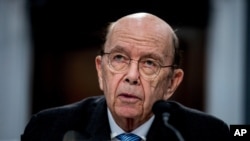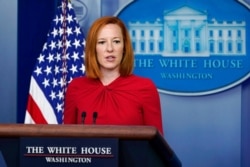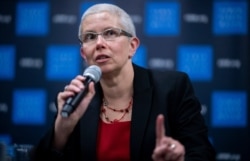The White House said Friday that it is “undeterred” by the latest sanctions announced by China targeting several U.S. citizens, which came days after Washington sanctioned seven Chinese officials over Beijing’s crackdown in Hong Kong.
“We’re undeterred by these actions and we will remain fully committed to implementing all relevant U.S. sanctions authorities,” press secretary Jen Psaki said in response to VOA’s question during a White House news briefing.
“These actions are the latest examples of how Beijing punishes private citizens, companies and civil society organizations as a way to send political signals and further illustrate the PRC’s deteriorating investment climate and rising political risk,” Psaki added.
Earlier Friday, China sanctioned former U.S. Commerce Secretary Wilbur Ross and several other Americans who have been involved in U.S. China trade policies and human rights issues, following Washington’s sanctions against seven deputy directors and the director of Beijing's Hong Kong liaison office.
“The relevant actions of the U.S. seriously violated international law and the basic norms of international relations and seriously interfered in China’s internal affairs. China firmly opposes this and strongly condemns it,” a statement from Beijing said.
At the White House on Friday, Psaki said there is bipartisan support over what she called “outrageous moves” to target those who defend universal human rights and fundamental freedoms and said the sanctions “only demonstrated Beijing’s further isolation around the world.”
Americans react
Besides Ross, China said it would target U.S.-China Economic and Security Review Commission Chairperson Carolyn Bartholomew, former Congressional-Executive Commission on China staff director Jonathan Stivers, DoYun Kim from the National Democratic Institute, International Republican Institute Associate Director Adam King, Human Rights Watch China Director Sophie Richardson and the Hong Kong Democracy Council.
Several of those named Friday dismissed Beijing’s actions.
"I have to say it's noise. It's a distraction,” Richardson, a frequent critic of Beijing’s human rights policies, told VOA in a phone interview.
“We have work to do, and these sanctions are not in any way going to distract us from continuing to do our work. And I only wish that the Chinese government would focus its energy on ending crimes against humanity against Uyghurs, among other serious human rights crimes."
Samuel Chu, the managing director of the Hong Kong Democracy Council, based in Washington, released a statement saying Beijing’s sanctions are only elevating the group’s work.
“Being targeted and sanctioned by an authoritarian regime like the CCP is a badge of honor. It is the best validation of what and who we are fighting for,” he wrote.
The sanctions are the first by China under an anti-foreign sanction law passed in June and come just ahead of U.S. Deputy Secretary of State Wendy Sherman’s travels to China. Psaki said Friday there are no changes to Sherman’s planned trip.
Others said these targeted sanctions against individuals would have a limited impact on the broader U.S.-China relationship.
“The tit for tat on sanctions is a continuation of a long pattern and mainly ‘feel-good’ foreign policy,” said Nicholas R. Lardy, a senior fellow at the Peterson Institute for International Economics and an expert on the Chinese economy.
“None of the Chinese individuals named by the Biden administration probably ever had any plans to come to the United States,” Lardy told VOA.
“Similarly, I doubt that for Wilbur Ross, traveling to China is at the top of his wish list.”
Some information in this report came from Reuters.






